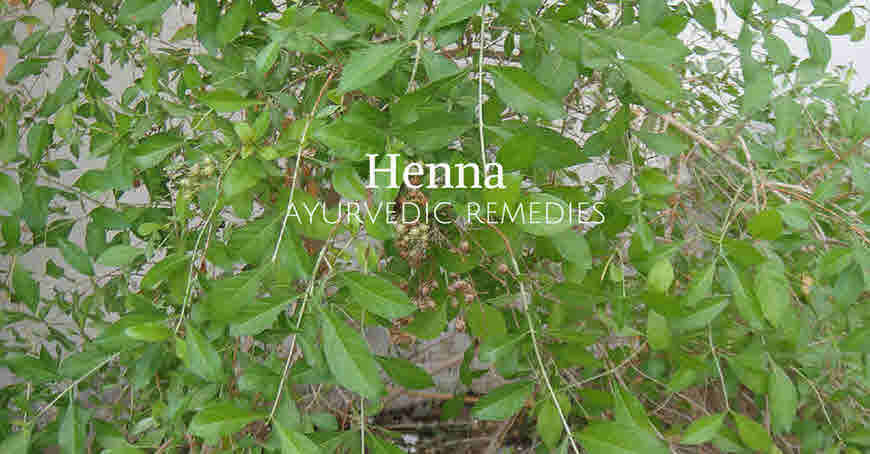Henna or Mehandi is very well-known medicinal herb for its use as natural hair dye. The powder prepared from its dried leaves is known as henna or mehandi powder. This powder is mixed with water for coloring hairs and beautification of palms, feet.

There are numerous other medicinal uses of this plant. Its leaves has kapha and Pitta alleviating properties. It is also useful in the fever, burning sensation, skin and the liver diseases. Its external application is useful in wounds, swellings and fungal infections.
Henna leaves have astringent and antibacterial properties and useful in washing wounds, boils and skin infections. Its decoction is useful in gargling to cure oral infections and mouth boils.
In folk medicine its bark, leaves are used for treating the liver and spleen diseases.
Henna Tree Information
Henna is evergreen branched shrub or small tree (2 to 6 m in height). This medicinal herb is native to North Africa and South East Asia and often cultivated as an ornamental plant, as boundary hedges in lawns and gardens. In India, henna is cultivated for commercial use mainly in Haryana and Gujarat and to a lesser extent in Madhya Pradesh and Rajasthan.
Names of henna
Latin Name: Lawsonia inermis
Family: Lythraceae
| Sanskrit: Nil Madayantika, mendika, Madayanti, Ranjaka Hindi: Mehandi English: Henna Bengali: Mehadi Gujrati: Mendi Oriyya: benjati Punjabi: Mehndi |
Telugu: Gorinta Urdu: Mehendi, Hina Kannada: Goranta, Korate, Madarangi, mayilanchi Malayalam: Mailanelu, mailanchi Marathi: Mendi Tamil: Marudum, muruthani |
Henna properties and action according to Ayurveda are as follows.
- Rasa: Tikta, Kashaya
- Guna: Laghu, Ruksha
- Virya: Sheeta
- Vipaka: Katu
- Karma: Kaphashamak, Pittashamak
Henna leaves contain Glycosides, coloring matter (Lawsone), Hennotannic acid and Essential Oil containing ?-Ionone.
Henna leaves have analgesic, hypoglycaemic, antimalarial, hepatoprotective, nootropic, immuno-stimulant, anti-inflammatory, antibacterial, antimicrobial, antifungal, antiviral, anti-parasitic, antitrypanosomal, antidermatophytic, antioxidant, anthelmintic and antifertility properties.
Ayurveda mentions henna is useful in treating fever, leprosy, raktapitta (bleeding disorders), jaundice, mutrakrucchra, dysuria, bhram and skin diseases. The leaf is also recommended in giddiness and vertigo.
Henna leaves are used externally for hair coloring, conditioning and also for the skin infections treatment. Its leaves are useful in treating fungal infection of hands and feet. The dosage of fresh leaves juice of henna is 5 to 10 ml.
Here are some remedies of henna leaves
-
Boils
Wash affected areas with henna decoction.
-
Bleeding diarrhea
Grind henna seeds and mix ghee. Prepare small pills. Take these pills twice a day.
-
Dysuria
Prepare henna leaves (50 gm) cold infusion and add 1 gm Kalmishora and take twice a day.
-
Inflammation of the spleen, Splenomegaly
Mix henna bark powder (30 gm) and Nausadar powder (10 grams). Take this mixed powder (1 tsp) with henna leaves juice (3 ml) twice a day for two weeks.
-
Joint pain
Grind henna leaves and castor leaves in equal amount, heat it and tie at affected joints.
-
Kidney stone, calculi
1. Take henna bark (10 gm) and boil in water (200 ml) at night. Next morning filter this water and drink. Repeat this for a few days.
2. Soak henna leaves and wood in a glass of water at night. Next morning, decant solution. Give Yava kshaar (2 gm) followed by the decanted solution. Repeat this treatment for a few days. It helps to expel kidney stone through urine. -
Jaundice, the liver problem
Soak henna leaves (5 gm) in water (100 ml). Next morning mash the leaves and filter the solution. Drink this solution once a day for one weak.
-
Pain due to fever
Boil henna leaves (10 gm) 200 ml water and drink this infusion.
-
Mental disorder
Take henna seeds (3 gm) mixed with honey.
-
Mouth ulcer, boils, oral inflammation
Soak henna leaves (10 gm) in water (200 ml). Mash leaves and filter solution. Use this solution to gargle.
-
Sujak
Take henna leaves (50 gm) and soak in water (500 ml) for night. Next morning filter the solution. Drink this solution (20 ml at a time) 3-4 times a day.
-
Headache due to heat, pitta
Cook henna leaves (25 gm) in coconut oil (50 ml) till all water evaporates and only oil is left. Apply this oil on scalp.
Or extract juice of henna flowers (5 gm) and mix honey (7 ml) and drink. -
Skin diseases, leprosy
1. Extract flower and leaves juice of henna. Take this juice half teaspoonful twice a day.
2. Boil bark of henna (100 gm) in water (200 ml). Cook till water reduces to 50 ml. Filter this and drink twice a day.
3. Soak henna leaves (75 gm) in water at night. Next morning mash the leaves and filter the solution and drink twice a day. -
Spermatorrhoea or semen loss
Extract henna leaves juice s(5-10 ml), add water and misri. Take twice a day.
Very good and educative, keep it up.
How can it be applied to increase sexual performance in men?
Thank you very much